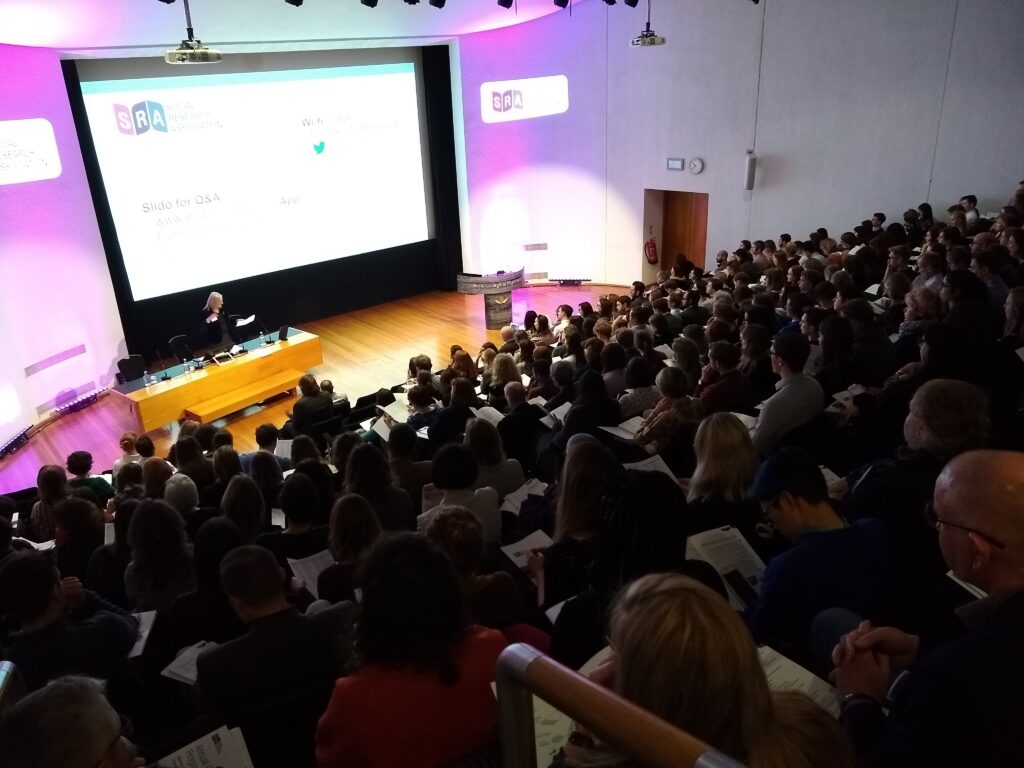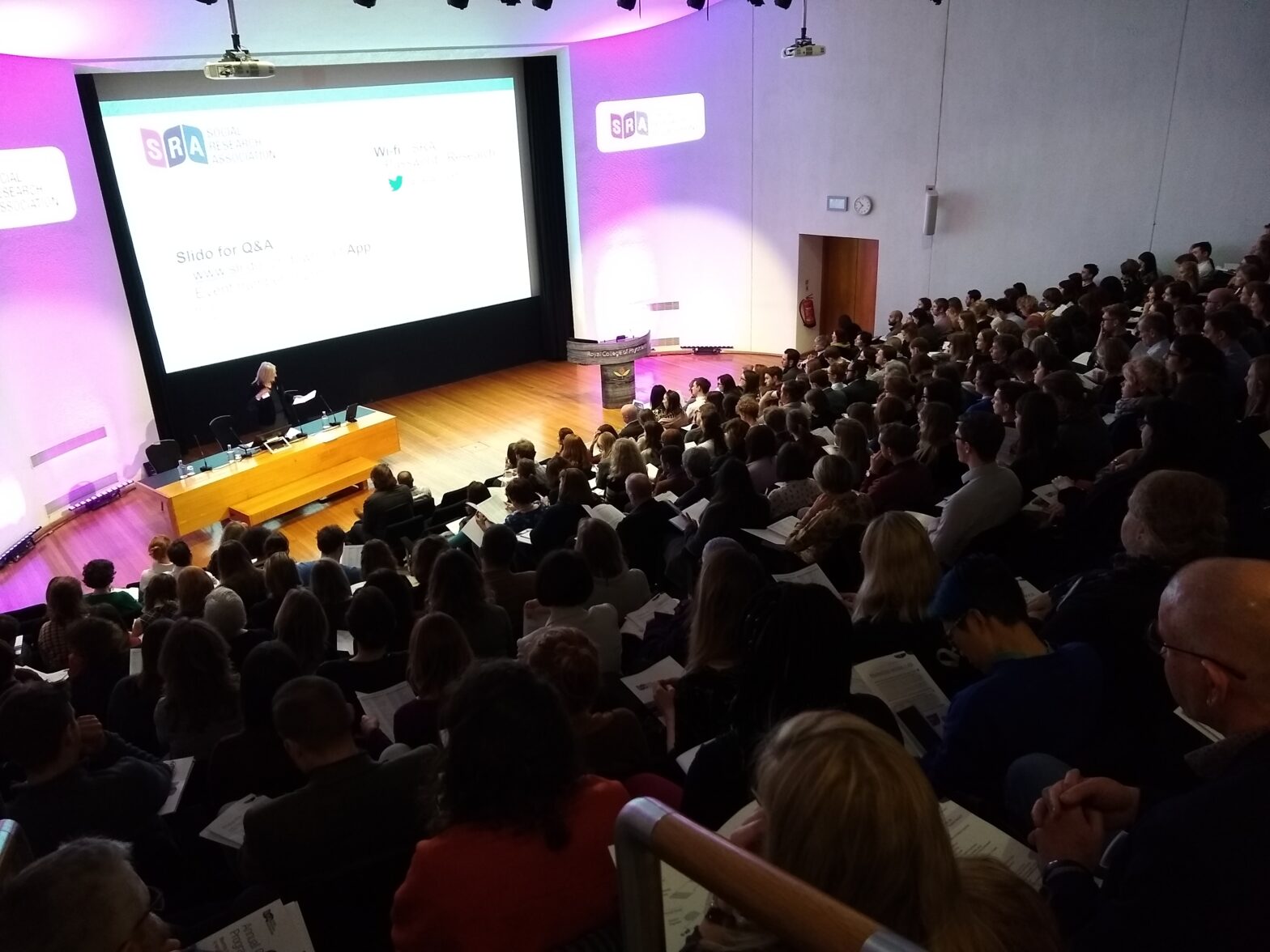I attended the Social Research Association Annual Conference in London recently. As a Market Research Society member, it felt a little like going undercover… but I immediately felt very much at home. And much like the MRS Annual Conference, it was inspiring to be surrounded by so many smart, creative researchers and to spend a day learning from their work, their challenges and their successes. So here are my key highlights and takeouts from this year’s SRA conference, ‘Blurring boundaries and crossing frontiers in social research’
Female academic researchers are doing important, fascinating, change-driving work
Plenary sessions from Professors Pamela Cox and Lorraine Whitmarsh were nothing short of inspiring. Not to mention fascinating (and heart-breaking) food bank research presented by Dr Claire Thompson from the London School of Hygiene & Tropical Medicine (discussed below).
As Director of the UK Centre for Climate Change & Social Transformations (CAST), Prof. Whitmarsh showed a real commitment both to understanding public opinion, and to increasing public participation in decision-making around climate change. Her conviction that public participation is vital for the radical social change required to find solutions for global warming, and in garnering public trust in those solutions, was compelling. It made me feel hopeful that change is still possible.
I particularly enjoyed her insights into the ‘participatory turn’ in science and policy following the reproducibilty crisis in the social sciences. Especially the need to reduce the distance between experts and non-experts and ‘democratising expertise’, a subject that’s always been close to my heart. I believe making ideas/insights understandable is a critical skill for any researcher or insight professional and always take care to make sure my work is as clear and easy-to-understand as possible. Why should stakeholders run with your recommendations if you haven’t made the effort to make your insights as easy to pick up and action as you can?
Prof. Cox’s plenary on the importance of interdisciplinary collaboration was also timely, relevant and enjoyable. In these times of discord, a reminder that working in a spirit of ‘communication, clarity, compromise and reflexivity within/between specialisms’ can ‘open up new creative common ground as a public good’ was refreshing and inspiring. And her insights into the learning curve involved in making her documentaries Servants and Shopgirls were fascinating. Having spent so long in the retail industry, I must confess Shopgirls was a must-watch for me, and there may have been a little fan-girling going on at this point in the day… !
Qualitative research plays a crucial role in a world where big data has the biggest ‘buzz’
Two presentations on qualitative research underscored this for me, not that I needed much persuading. I’ve always enjoyed working with data (at Tesco Clubcard and Nectar), but have also always loved the richness of insight that qualitative research brings to a project. And so I’ve also spent much of my career commissioning or conducting qualitative research – on topics as varied as attitudes to food, clothing, entertainment, investments and even secondary school choices.
Firstly, Laura Bolton & Roz Warden of the Barnwood Trust discussed how their insider-outsider status was a real benefit in an internal research team, investigating the reach and impact of the work of a charitable trust. The depth of insight they obtained through qualitative interviews with their colleagues was impressive, and their awareness of their position as insider-outsiders, and the ethical and trust issues that raised was thought-provoking.
The second paper was by Claire Thompson of the London School of Hygiene and Tropical Medicine, entitled A Qualitative Study of Food Banks, Food Poverty, Referrals, and Health in London: Methodological and Ethical Reflections. This was the last presentation of the day, but even in the late afternoon, Dr Thompson’s reflections held my attention throughout. We’ve all read the stats about food banks in the press, but what struck me is how far from reflecting food bank users’ experiences my own perceptions were. Issues of precarity and stigma came to mind before I attended the session, but concepts such as transactional volunteering were entirely new to me (moving from food bank user to food bank volunteer whilst still experiencing food poverty, so that you can still access some food despite being ‘out of’ referrals for the year). However, what I found most thought-provoking was the following slide:
“Experiencing food poverty means (amongst other things) not being able to access a sufficiently nutritious and appropriate diet in a consistent and socially acceptable way. The poverty that causes this also impacts negatively on people’s ability engage in everyday activities that most of us take for granted –including meeting in a café, returning a phone call, and chatting about their lives in general –all things that participating in a study might involve.”
Without the sustained efforts to conduct qualitative research in potentially ‘difficult to research’ areas such as these, we would miss out on vital insights which can make a real difference in policy formation, and in turn make a real difference in people’s day to day lives. Qual matters.
And finally… Big Data is top of mind (as it is for everyone)
The keynote from Sir Adrian Smith, Director of the Alan Turing Institute was ‘What the new frontiers of data science and AI may mean for social research’. I particularly enjoyed his discussion of “Hyper-entrepreneurial state-surveillance capitalism” – namely, that the Chinese economy in particular is configured around and intricately interwoven with surveillance via big data. (Source: AI Super-Powers by Kai-Fu Lee, which will figure on my 2020 booklist for sure.)
On a different note, I was also fascinated by the discussion of Professor Ruth Ahnert’s Living with Machines project, which is digitising and interrogating 19th Century press archives using AI and data science. The aim is to understand how tech changed society during the 19th century, and what those learnings can tell us about potential impacts our new technologies could have on society in the 21st Century. And all this by using 21st Century tech to interrogate the 19th Century press. Amazing.
In short, I’m very glad I attended the SRA Conference, and look forward to attending next year.


